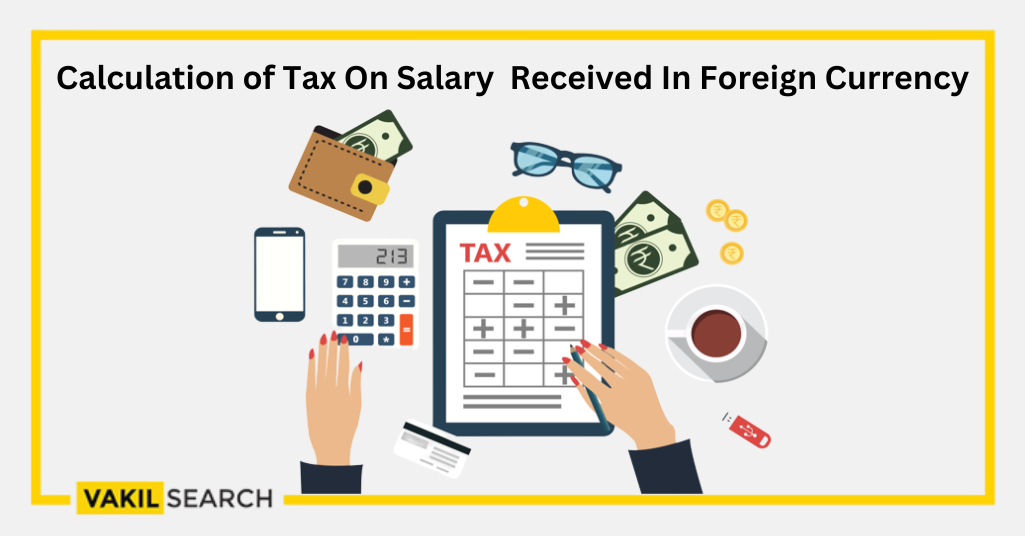Indian residents are liable to pay income tax on their entire worldwide income. This article offers insights into how one can be exempted from the income tax on salary in foreign currency in certain cases.
A resident of India will be liable to pay income tax on his worldwide income. The term “worldwide” means the total amount of income from all sources, including India or abroad, and therefore liable to pay tax on salary in foreign currency. Thus, a person who lives in India and, at the same time, has a foreign source of income and earns money from outside India would also have to file returns with the Indian Income Tax Department, provided the service rendered in India using the country’s assets, services, and facilities. Let’s discuss in detail about tax on salary received in foreign currency.
Factors Determining Whether a Person Is Taxable or Not
It is important to note that income tax laws in India consider two major factors to determine whether a person is taxable or not. These two factors are –
- The source from where the income is being generated – Here, the source is decided by combining two things, the geographical territory within which the service or job has been carried on, and the location of the assets or facilities used to perform the job. Therefore, if a person lives in India and conducts a service using assets and resources available within the Indian geographical boundary, whether these resources are physical or virtual in nature, they will be taxable regardless of their citizenship status.
- And the residential status of the concerned person – This factor is not fixed and dynamic in nature as it is decided every year considering an individual’s physical existence within India when the job has been performed. It also takes the concerned individual’s previous ten years’ residential status into account.
Therefore, if a person is a resident citizen of India, or maybe living in India ‘ordinarily’ (both mean different things), he or she will be subject to income tax irrespective of whether they earned the income from an Indian employer or abroad.
For example, if someone is hired by a US company, but instead of going to the US on a work visa to work for the employer from American soil, he or she is still living in India and working from their home for that American employer and receives their paycheck deposited in their Indian bank account – they will be liable to pay tax on salary in foreign currency as per the applicable tax slabs.
Now, according to Indian income tax regulations, the company should cut the applicable tax on the source, which is commonly known as TDS. And this is applicable to any foreign employer (registered and operated from abroad) as well.
However, if the foreign employer does not deduct the TDS from the salary of its India-based employee, it becomes the particular employee’s responsibility to pay the applicable taxes in compliance with the advance tax mechanism during the current financial year when the salary has been deposited in their Indian bank account. In that case, the tax payment schedule should be maintained as follows –
- 15% tax should be paid within June 15th
- 45% tax to be paid within September 15th
- 75% tax needs to be paid before December 15th
- And total tax must be paid by the following year, March 15th
One may also want to pay this in the form of self-assessment tax in order to file their income tax return successfully. In that situation, they may require to pay penalties if there is any delay in tax payment or non-payment.
That being said, there are tax exemptions in some instances, provided the individual fulfills certain conditions according to the income tax law of India.
For example, the person can be eligible for tax benefits on several components of his or her salary, such as house rent, gratuity, etc. However, the income tax department may want to analyze the salary received from a foreign employer before determining the eligibility of such exemptions.
Now, there are a number of cases where a person can be exempted from paying income tax in India.
-
Exemptions for Individuals Employed in United Nations and Its Various Organizations and Agencies
According to the 1947 United Nations (Privileges and Immunities) Act, persons directly employed by the United Nations or several of its agencies are exempted from paying any kind of income tax against their salaries received from the organization, even if they are residents of India and the service rendered within the geographical boundary of India. Former UN employees or officers who receive pensions from their past employment with United Nations are also entitled to tax exemptions.
The central government of India also extended this privilege to some other cross-border organizations, including the Red Cross, the Palestinean Liberation Organisation, the Asian Development Bank, the League of Arab States, the International Court of Justice, and others.
-
Protection Against Double Taxation
Typically, India is covenanted with many countries through DTAA or double taxation avoidance agreements to avoid situations where an individual with foreign-generated income is taxed two times, i.e., in the foreign country where his or her salary has been sourced and in India, where the paycheck has been deposited. However, in some cases where the person received their salary from an employer situated in a foreign country with which the Indian government has no such agreement, they can claim exemptions according to the income tax act, section 91, provided the foreign government has deducted tax from the source.
-
Exemptions on Government Allowances Paid to Render Services on Foreign Soil
The central government of India and state governments can pay allowances to their Indian citizen employees during their duties abroad for services rendered in a foreign country. Any such remunerations are exempted from being taxed. For example, officers employed in Indian embassies in foreign countries can receive additional allowances beyond their regular salaries, which are not taxable.
-
Exemption on Foreign-Sourced Salaries if Employed Under Technical Cooperation Programs
If a person is employed under a foreign company that posted him or her in India to work on a project that comes under any of the Indian government’s technical cooperation programs where there is some sort of agreement between the Indian government and the foreign government, then the salary paid by the company abroad can be exempted from income tax.
Conclusion – How is Tax Calculated On Salary Received In Foreign Currency?
Indian income tax regulations are complicated and can be challenging to understand for an average person without a sound knowledge of tax laws or professional help. Hope this blog how is tax calculated on salary received in Foreign currency is helpful. It is always wise to seek legal assistance from an expert such as Vakilsearch who can explain everything, including the applicable tax on salary in foreign currency in layman’s terms, and guide an individual through the process.
Also, Read:










